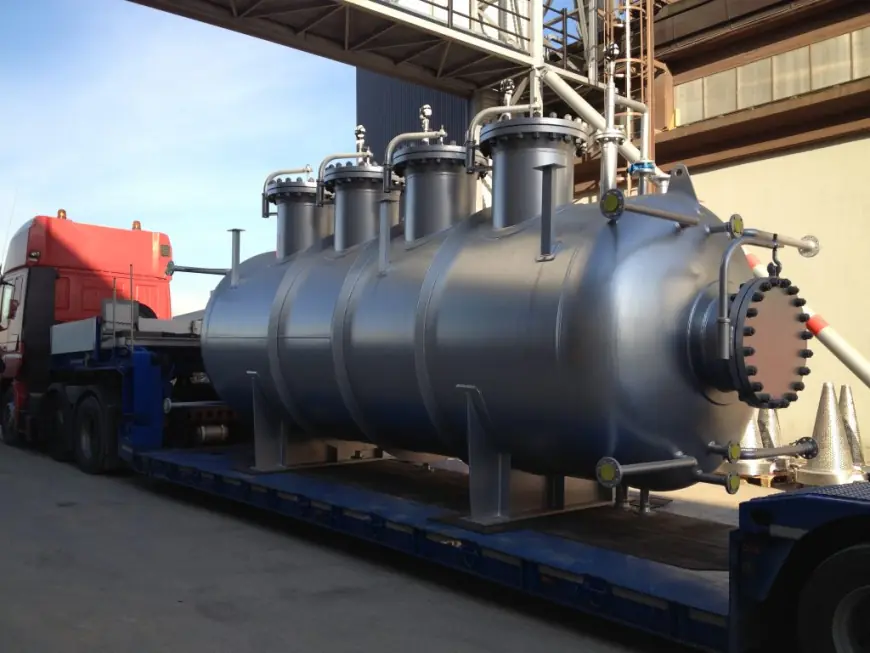Applications and Benefits of Pressure Vessels in Industrial Use
Learn about the applications, benefits, and safety aspects of pressure vessels in various industries. Understand their role in handling gases and liquids efficiently.

Pressure vessels are essential components in industries that deal with gases and liquids under high pressure. They are specially designed containers built to withstand extreme internal or external pressure. From power plants to chemical industries, these vessels ensure safe storage and efficient processing. Their design, manufacturing standards, and applications make them indispensable for modern industries.
This blog explores the applications and benefits of pressure vessels while highlighting why they are a critical part of industrial operations.
What is a Pressure Vessel?

A is a container designed to hold gases or liquids at a pressure significantly different from the ambient pressure. These vessels are manufactured from materials like carbon steel, stainless steel, and alloy steel, depending on the requirement. They are built following strict standards such as ASME Boiler and Pressure Vessel Code to ensure safety and reliability.
Applications of Pressure Vessels
-
Oil and Gas Industry
Pressure vessels are widely used for the storage and transport of petroleum products, natural gas, and crude oil. They also serve in refining processes where gases and liquids are kept at specific pressures. -
Chemical Industry
Chemicals often need controlled environments for reactions and storage. Pressure vessels provide secure containment for hazardous and volatile substances. -
Power Plants
Boilers, steam drums, and heat exchangers are types of pressure vessels used to generate and manage steam for electricity production. -
Pharmaceutical Industry
In pharma production, pressure vessels maintain sterile and controlled environments, ensuring product quality. -
Food and Beverage Industry
Pressure vessels help in processes such as pasteurization, carbonation, and fermentation. For example, breweries rely on these vessels for safe beer fermentation. -
Water Treatment Plants
Pressure vessels are used for desalination, filtration, and reverse osmosis systems, ensuring clean and safe water supply.
Benefits of Pressure Vessels
-
Safe Containment of Hazardous Materials
They provide a secure way to store and handle chemicals, gases, and other hazardous substances. -
Efficiency in Industrial Operations
Pressure vessels enhance process efficiency by maintaining required pressure and temperature for reactions and storage. -
Durability and Longevity
Made with high-quality metals, pressure vessels are resistant to wear, corrosion, and extreme conditions, ensuring long service life. -
Customizable Designs
Pressure vessels can be designed in various shapes and sizes to meet specific industry needs. -
Cost-Effectiveness
By reducing the risk of leaks, accidents, and energy losses, pressure vessels contribute to long-term savings.
Safety Standards for Pressure Vessels
Since pressure vessels operate under high risk, safety regulations are crucial. Standards such as ASME Section VIII provide guidelines for design, manufacturing, and inspection. Regular maintenance, pressure testing, and certification are mandatory for safe operation.
Future of Pressure Vessels
With industries moving toward sustainability, modern pressure vessels are being designed with advanced materials, automation, and monitoring systems. Smart sensors, corrosion-resistant alloys, and eco-friendly designs are setting new trends in this field.
Conclusion
Pressure vessels are the backbone of many industries, ensuring safe storage, efficient operations, and long-term reliability. Their applications span across oil and gas, power, food, water treatment, and pharmaceutical sectors. By following safety standards and choosing the right materials, industries can maximize the benefits of pressure vessels.
What's Your Reaction?
 Like
0
Like
0
 Dislike
0
Dislike
0
 Love
0
Love
0
 Funny
0
Funny
0
 Angry
0
Angry
0
 Sad
0
Sad
0
 Wow
0
Wow
0
















































